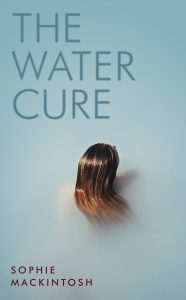 Published by Hamish Hamilton 24 May 2018
Published by Hamish Hamilton 24 May 2018
256pp, hardback, £12.99
Reviewed by Alison Burns
Sophie Mackintosh’s seductively sinister first novel takes us to an unnamed, imaginary place, some time in the near future. Three sisters live with their mother in a large house by the sea. The house has a pool, a ballroom, innumerable bedrooms, a reception desk. The heat is almost insupportable; in the distance, the horizon glows, its air ‘peach-ripe with toxicity’. The father-figure, King – supplier of life-guarding weapons, and inventor of survival games – has suddenly disappeared.
Where are we? What has happened to King? What has happened in the world beyond?
In one of the earliest of her many memorable statements, one of the sisters, Lia, says: ‘My dreams are boxes filled with boxes filled with small trapdoors.’ Through this and other seemingly throwaway remarks, we gradually come to know this strange environment, where threat comes not just from afar. Household rituals and chores are at once quaint, repetitive, life-preserving, dangerous and deadly boring. Apparent luxury (hot and cold water, light,
food, a functioning swimming pool) is more makeshift than it appears: there are tins of fruit cocktail, for example, but no service staff. We learn that King would go away every few months by boat to the mainland on three-day supply trips, returning exhausted from his exposure to toxins. Maybe this is where he has gone this time. They don’t think so.
Without King, the girls’ mother is extremely tense, enforcing positively medieval routines and therapies – the drowning game, with its attendant drowning dress; the water cure; scream therapy; love therapy; the fainting sack – which turn out to be designed to cure them of the feelings that will make them vulnerable. The suspicion grows that this pernicious ‘safe place’ has been created out of King’s paranoia.
We learn that Lia self-harms and that her sister Grace is pregnant; and that the house was once full of sick women who came to be saved (the girls have read the entries in the Welcome Book, which recount unspeakable abuses and the methods resorted to for survival).
And then, into this strange protected world, full of prohibitions and surrounded by a barbed-wire boundary, come men: three of them, two adults and a boy, washed up.
What follows is both predictable and unexpected. Not for nothing has King raised his daughters to be on guard for their lives: ‘The violence came for all women, border or no border.’ Lia is torn between conflicting compulsions, in one case tempted to hack off her hand with a meat cleaver. The end of what their mother called ‘a failed utopia’ is indeed bloody, with bloodstained deceptions emerging.
Mackintosh won the 2016 White Review Short Story Prize and the 2016 Virago/Stylist Short Story Competition, and has been published in Granta magazine and TANK magazine among others. In this full-length debut, her eloquence deepens in a very fine finale, where much is made of women’s angry need, and men’s indifference. Her alternative world is as carefully imagined as one of Margaret Atwood’s, her story powerful and mythic, although very bleak (with this degree of intensity, it is good that the sections are relatively short, allowing revelations to be truly shocking). Clearly, she is a writer to be reckoned with.
